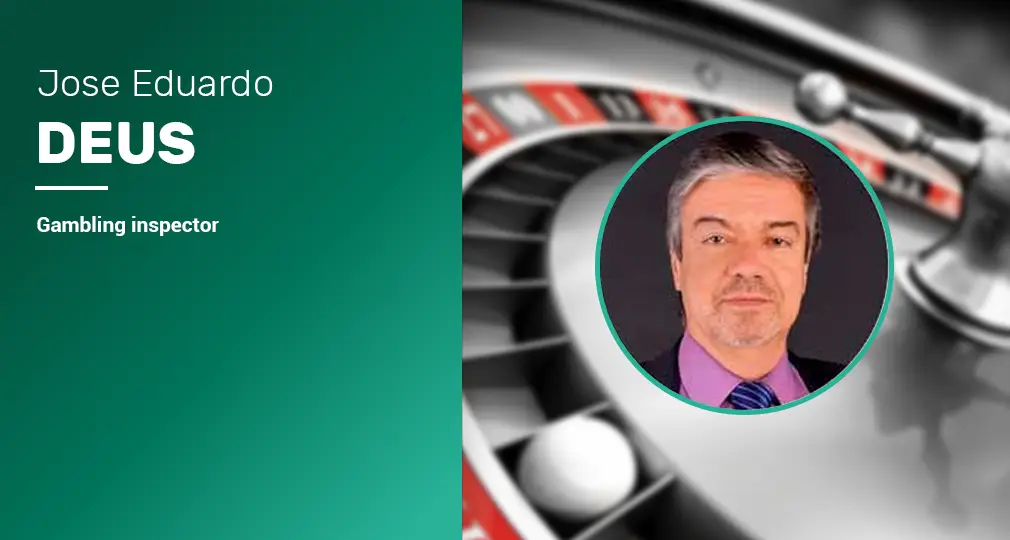The Portuguese gambling market is much-discussed in the trending news articles in the casino sector and has a perspective of becoming one of the biggest gambling jurisdictions in Europe.
José Eduardo Deus, a gambling inspector with 31 years of experience in the Portuguese casino market, has provided expert insight into the offline and online casino sectors in the country, talked about the peculiarities of the Portuguese gambling regulations and spoke about the history and development of the gambling industry in the country.
José, can you give an overview of the gambling market in Portugal?
There have been geographically delimited gambling areas since 1927, the year in which casino gambling was regulated for the first time in Portugal. This model, which is based on the Portuguese state granting gambling concessions through a public tender to private operators (gambling concession companies) has been maintained to this day. Currently, there are 12 land-based casinos in the country.
In 2015, legislation on online gambling was approved, and its exploration is based on the attribution of gambling licenses to private operators. In March of this year, there were already 15 entities authorized to explore online gambling in Portugal, corresponding to 26 licenses (11 licenses for sports betting with odds and 15 for online games of chance).
In early 2021, the offline gambling industry was struggling while iGaming was on the rise. In your opinion, what impact will the recent reopening of real casinos have in Portugal have? Do you believe that terrestrial gaming could return to the pre-COVID-19 level?
iGaming was already on the rise in Portugal before the start of the pandemic crisis. What the pandemic did was accelerate that process even more. With the forced closure of land-based casinos, there was naturally some player transfer from physical to online.
The most pessimistic will say that land-based casinos were beginning to recover only 6 years after the 2008 financial crisis, that is, in 2014. Therefore, and apparently, this pandemic crisis will also lead to a slow and difficult recovery.
The most optimistic say that physical gambling has a future because it is a different product from virtual casinos, very valuable because the human being is a social being and people are very eager to live again in a physical environment, interacting with others, and not confined at home to a cell phone or computer screen.
Of course, these conjectures are not unrelated to aspects such as the taxation to be applied to new concessions and/or gambling licenses, or the possible and necessary reinvention of physical casinos in the future, with more modern models.
As a legal expert, what do you consider to be the main drawbacks of the current gambling legislation in Portugal?
Reality is changing faster and faster and, naturally, some regulations need to be revised or reformulated.
The legal diplomas relating to online gambling are from 2015, therefore, relatively recent and so they will only need minor adjustments, even because this legislation is consistent and well-systematized. The 2015 legal diploma predicted its review after 2 years since its entry into force, as this is the first Portuguese legislation on online gambling. The legislator has well foreseen, let’s say, an “experimental legislative period”, which nevertheless has responded well to the needs of the activity.
With regard to the legislation on land-based casinos and considering that some casino gambling concessions, such as the Estoril casino, Lisbon casino, and Figueira da Foz casino, expired at the end of 2020 (with an extension for another year, until the end of 2021, due to the pandemic), in addition to the definition of the new legal framework in force for these new concessions, it will be necessary to prepare the tenders for the new concessions, as well as to harmonize all this with the concessions still in force (namely those that expire in 2023, namely: Espinho and Casinos of Algarve).
Gambling taxes in Portugal are known to be higher than in many European jurisdictions. In your opinion, what impact does this have on the gaming industry? Does the high level of taxes prevent new operators from entering the market?
Answering the question about the online gambling plan, as I believe that it is this plan that your question is referring to, I will say that the gross revenue values practically quadrupled between 2017 and 2020, with the largest annual percentage increase registered between 2019 and 2020.
In January 2017, online gambling and betting services in Portugal had a turnover of around 31 million euros per quarter; four years later, this value has increased historically, surpassing 100 million euros in December 2020.
The last quarterly statistical report issued by the Regulator (SRIJ), published on March 31st, 2021, revealed that gross revenue figures grew 74.7% in 2020, compared to the same period of the previous year.
Therefore, the taxation applied to online gambling in Portugal will perhaps be appropriate to the size and characteristics of the Portuguese gambling market, as well as to the control that will be intended to be exercised with regard, in particular, to excessive gambling.
What about responsible gaming? What steps have the authorities taken to ensure a safe gaming environment?
Current national legislation on this matter is inspired by European recommendations and based on well-known and consolidated good practices that aim to protect players by safeguarding public order and by controlling the social risks associated with gambling.
From the outset, the Gambling Law (Decree-Law nº 422/89, of December 2, in the wording of Decree-Law No. 64/2015, of April 29) establishes imperative rules, the violation of which constitutes an administrative offense, in order to prevent access to casinos for minors, encourage and coerce the practice of gambling, loaning in cash or by any other means to players.
In this way, it is intended, on the one hand, to protect, by not exposing the most vulnerable social groups to the risks those games can entail and, on the other, to discourage uncontrolled debt practices of the players.
In particular, with regard to the practice of the game of bingo, the Decree-Law No. 31/2011, of March 4, amended by Decree-Law No. 65/2015, of April 29, imposes on concessionaires to operate the rooms of bingo, as follows from paragraph 2 of article 5, specific obligations within the scope of practices relating to responsible gambling. It, therefore, impinges on those entities and, as well, on their workers, the duty to make available to players, in articulation with the competent authorities in the matter, information about problems of addiction and addiction to gambling and about the entities that provide support for players with addiction and addiction issues.
The exploiting entities, in accordance with article 7 of the RJO (Regulation of Online Gambling), have the duty to draw up a plan and adopt measures to ensure the practice of responsible gambling and to provide the public, in particular to players, the necessary information, promoting moderate, non-compulsive gambling attitudes.
In your opinion, what is the role of women in the Portuguese gambling sector? How has this role changed over the years?
Even after the April 25th, 1974 Revolution and still within the scope of the 1969 law, for access to gambling rooms, a woman, being married, would necessarily have to obtain authorization from her husband to attend the room.
In practice, all restrictions of the period of the “Estado Novo”, which conditioned women’s rights in accessing casino gambling rooms, remained.
Although the 1976 Constitution of the Portuguese Republic declares equality of rights, regardless of gender, in gambling, women continued to be denied equal rights to men. Married women still couldn’t enter gambling rooms without the permission of their husbands.
In the last 30 years and following the entry into force of the 1989 gambling law, women entered the gambling world, growing, both as players and in the various professions connected with it.
The first three women to enter the profession in Portugal, made their ticket on December 1st, 1989, at Casino Estoril. They were the first women dealers in Portugal.
We currently find women in prominent positions in the various quadrants of the gambling field in Portugal.
Could you give some tips for traders who want to enter the Portuguese gaming market?
The Portuguese gambling market is a regulated market (in the case of land-based casinos, since 1927!), which is stable and secure, with a good capacity for growth and development, both in terms of physical gambling and in terms of online gambling. Of course, an operator will always have to be aware of the typical profile of the Portuguese gambler, given that the state, as well as the licensed operators increasingly share the idea of shared social responsibility, which aims, on the one hand, to enhance the player’s experience and, on the other, to make it viable of a more competitive business model. In everyone’s interest.
Read more: Best iGaming Aggregators












